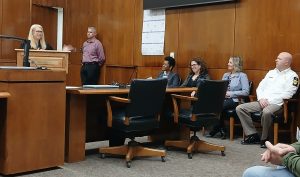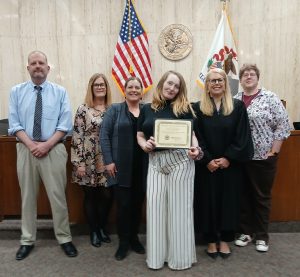Largest class ever graduates from drug-court program
By Tim Alexander For Chronicle Media — March 29, 2025
Lillian Barrett (right), 33, of Bartonville, shares tears of joy and a hug with Blair Hill, a substance abuse counselor with Carle Health-Trillium, following Barrett’s graduation from Peoria County’s drug court. (T. Alexander photos/For Chronicle Media)
PEORIA – For 10 graduating students of the Peoria County 10th Judicial Circuit Court’s Second Chance Program, it was a day of reward and renewal.
At 1 p.m. Wednesday, the graduates of the county judicial system’s drug court gathered in Courtroom 210 of the Peoria County Courthouse, accompanied by law enforcement personnel, prosecutors, judges,
probation officers and counselors – whom each defendant had at one time in their journeys become acquainted with while navigating the court process.
The defendants were not in court to be adjudicated for a crime. Those on the side of law enforcement showed up not to testify in a case or take a defendant into custody. Those present were gathered to celebrate the proven sobriety and recovery of the defendants, and to witness Circuit Court Associate Judge Suzanne Patton absolve or reduce the drug-related charges held over their heads during the course of treatment and recovery.
Including two defendants who weren’t on hand for the celebration, it was the largest class of Second Chance graduates (12) since Judge John Gorman introduced the program almost 30 years ago.
“Our court is based upon accountability, “ said Patton, who was appointed to the 10th Circuit Court in 2015. “’When one rises, we all rise’ is the national slogan for these (drug) courts.
“We use a combination of close supervision, testing and rigorous treatment to hold participants accountable for their actions and help them to become productive members of the community. Through this treatment they change their criminal thinking patterns, take accountability for their actions and make long-term changes to avoid the mistakes of their past.”

Tenth Circuit Court Associate Judge Suzanne Patton (left) smiles just prior to the graduation ceremony in Room 210 of the Peoria County Courthouse. Witnesses to the drug-court graduation included (seated, from left) Illinois Supreme Court Justice Lisa Holder-White, 10th Circuit Court Judge Katherine Gorman, Peoria Count State’s Attorney Jodi Hoos and Peoria County Sheriff Chris Watkins. Court security chief Scott Metille is in the background.
Though known as the Second Chance program, many, if not all , of the participants to plead into the program have been allowed more than two opportunities to gain full sobriety. As Patton stated, the program has rigorous requirements: a special phone app requires participants to “check in” daily, and may signal them to come to the courthouse for a urine “drop” several days each week.
In addition, defendants must present themselves in front of Patton and their “recovery team,” which usually consists of law enforcement, probation, a mental and addiction healthcare worker and others, in drug court on a weekly basis.
Still, some drug-court participants test “dirty” and face “sanctions” from the court — or fail to show up for court dates– and end up facing more time in the program, expulsion or incarceration.
One graduate who spent years battling chemical addiction and, for a time, the courts, before graduating from the Second Chance program was Lillian Barrett, 33, of Bartonville, who agreed to talk to Chronicle Media about her journey.
Lillian’s story
Barrett, who grew up in Hanna City before moving to Bartonville, found drugs to be plentiful in her social circle during 2017 and 2018.
“It was like an epidemic surge of drugs came into this town for some reason,” she said. “It seemed like everyone I knew started either doing them or having them.
“Maybe it was just the crowd I was in. I don’t know, and I guess I fell victim to the social pressures and ended up getting addicted.
She added that at various points she became dependent on both opiates and methamphetamines.

Barrett is all smiles after Patton (second from right) presented her with certification releasing her from the Peoria County Second Chance drug-court program.
“In 2019, I got into trouble with the Peoria County sheriff, but I was so caught up in my addiction I didn’t care,” Barrett said. “I didn’t want to feel the effects of the sickness or face my legal issues, so I ended up going on the run for like three years.”
The law caught up with Barrett in 2022, leading to a three-month County Jail sentence. When she came out, Barrett found herself to be “clean” of drugs for the first time in years.
It was a feeling that she did not want to relinquish, but, as addicts know, the disease is both cunning and baffling.
“I was on probation at first and it just wasn’t going good. I owed a lot of money in fines and I couldn’t pay them, so they offered to let me in the drug-court program, which would X-out the fines but also carry a lot of responsibility,” Barrett recalled. “I decided to go with the program and it changed my life.
“It gave me support and people I could call, count on and trust, who weren’t discriminatory and didn’t judge me because I messed up a time or two. They gave me the tools I needed to integrate myself back into society.”
Though Barrett was briefly returned to jail by Judge Patton “a couple of times” for violating the rules of the drug-court program, she is grateful that the program actually protected her from a more lengthy prison sentence as punishment for her recidivism.
“I’d been in jail before, did months in the county, but those couple of (additional) nights Judge Patton sentenced me to, something clicked,” she said.
“I have an 11 year-old daughter and she had to suffer through this, too. My mother suffered, and my boyfriend, Donald, was also an addict who suffered. Now, we are clean together. He went through it with me, and now that we’ve been clean for a long time together we’ve realized it’s better this way. Drug court not only saved me, but it saved him as well.”
Many of the drug-court graduates expressed thanks, respect and affection for Patton and others on their Second Chance teams. Barrett said she owed gratitude to Jim Serblin, her probation officer, as well as Patton.
“When it came down to it, my fate was up to her,” she said of the judge. “She was tough on me and sanctioned me, and it sucked, but it got my butt in gear.
“At first, I thought I would do this (program) and then go off and do whatever I want. But during the time I spent just being clear-headed, we realized that it is so much better to live this way,”
Instead of sitting in prison for her addiction issues, Barrett was allowed to return to her Bartonville home, which she shares with Donald. Together, the couple care for Donald’s live-in father, who suffers from dementia. With help from her mother, Barrett and her daughter are on the path of putting the past in the rearview mirror and moving on with their lives.
Sentences vacated, reduced
In addition to Serblin and other probation officers, witnesses to the graduation included Illinois Supreme Court Justice Lisa Holder White, Peoria County State’s Attorney Jodi Hoos, Peoria County Sheriff Chris Watkins, Peoria Police Chief Eric Echevarria and members of the Peoria County Board.
Program founder Gorman’s daughter, Judge Katherine Gorman, was also on hand to wish the graduates well. The remainder of the courtroom was packed with families, friends and well-wishers of the graduates, some of whom brought flowers or signs to show their support for their friend or loved one.
The ceremony ended with Patton issuing orders on the disposition of the defendants’ cases. It was the moment for which they all had been working and waiting.
“I just want you guys to know how much we appreciate all the hard work you put into this because it makes all the hard work our team does worth it,” she said. “It is not fast and it is not easy. The amount of time you had to put into coming to this courthouse and to treatment every week was amazing, and harder than anything else you would have had to do.”
“Ninety-six percent of last year’s graduates of the drug court have committed no new offenses,” added
State’s Attorney Hoos. “This is one of those days when a courtroom is a very happy place.”
Since the Peoria County drug court was established in 1997, the program has expanded to include a Mental Health Court in 2010 and a Veterans Court and DUI Court in 2017.







